Ingebrigtsen gets pushed to the limit
Nuguse battles Norwegian star all the way to finish of men's mile in Prefontaine Classic
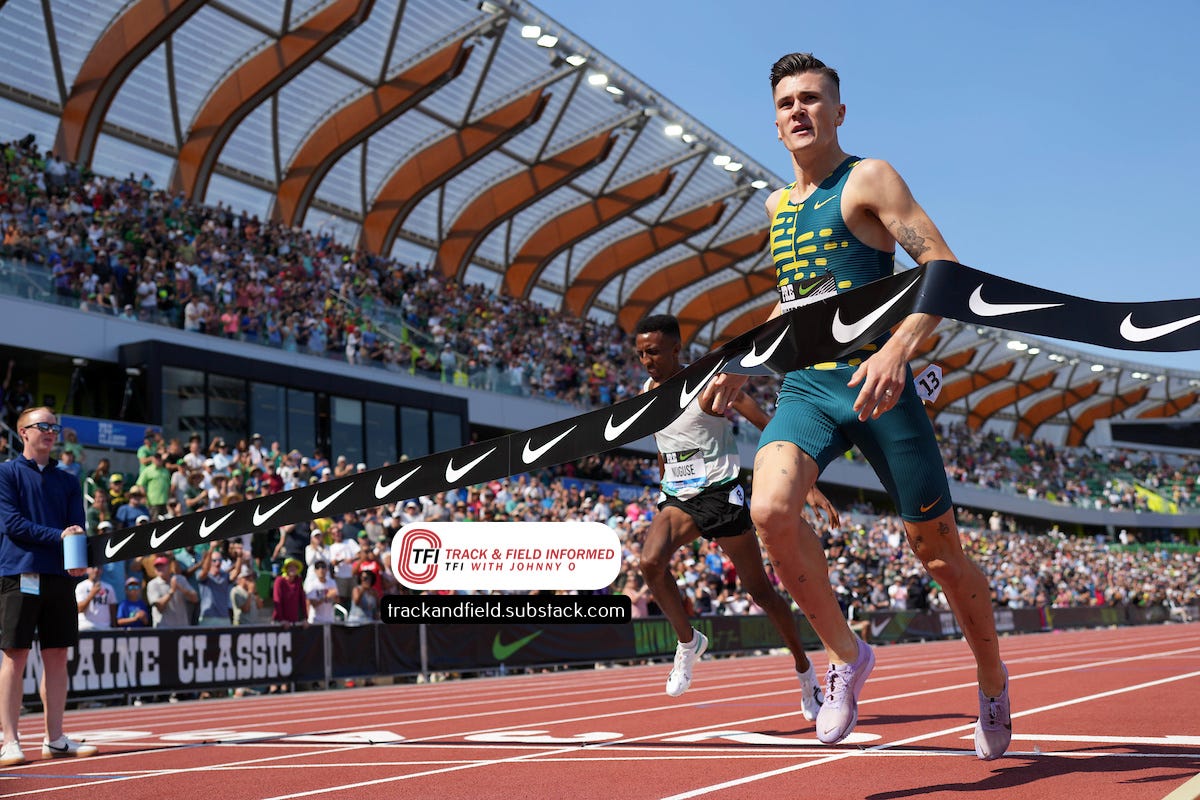
Jakob Ingebrigtsen was not blowing smoke.
The 22-year-old Norwegian had told Yared Nuguse of the U.S. in a press conference on Friday that if he stuck close to him for as long as he could in the men’s mile run in the Prefontaine Classic in Eugene, Oregon on Saturday, he would would break 3 minutes and 46 seconds in the event and lower the national record set 16 years earlier.
However, the supremely confident Ingebrigtsen probably didn’t envision Nuguse nipping at his heels all the way to the finish line in a race he won in 3:43.73 and in which the American placed second in 3:43.97.
It was a scintillating way to end the first day of the two-day meet at Hayward Field that is serving as the Diamond League Final for the first time that the competition has not been contested in either the Weltklasse meet in Zurich or the Memorial van Damme meet in Brussels.
Ingebrigtsen’s time was the third fastest in history while Nuguse’s effort was the fourth fastest ever run.
Only Hicham El Guerrouj of Morocco and Noah Ngeny of Kenya, who ran 3:43.13 and 3:43.40 while finishing first and second in the Golden Gala meet in Rome in 1999, have run faster than Ingebrigtsen and Nuguse, who now hold the European and North American records, respectively.
Ingebrigtsen’s mark crushed his previous best of 3:46.46 from last year and slashed more than two and a half seconds off the previous European record 3:46.32 that had been a world record when Steve Cram of Great Britain set it in 1985.
Nuguse’s time was more than three seconds faster than the 3:47.38 mile he ran indoors in winning the Millrose Games in New York City in February and he cut nearly three seconds off the previous U.S. — and North American — outdoor record of 3:46.91 that Alan Webb of the U.S. had set in 2007.
George Mills of Great Britain finished third in a personal best of 3:47.65, followed by Mario Garcia of Spain in a national record of 3:47.69, and 19-year-old Reynold Kipkorir Cheruiyot of Kenya, who set a world U20 (under 20) record of 3:48.06.
It was the fastest mass finish in history as a record 11 runners broke 3:50 — topping the previous high of six — and all 13 finishers ran 3:53.50 or faster. The times for the fourth- through 13th-place finishers were the fastest ever for those positions.
“He does a very good race, obviously he’s in a good enough shape to run what he does,” Ingebrigtsen said about Nuguse in quotes on the meet website. “But at the same time today I wanted to race where I could challenge myself to really set out at a decent pace, somewhat conservative, and then I go as hard as I could the last two laps to try to run as fast as I could. So it was very good.”
Pacesetter Cameron Myers of Australia led the field through the first 400 meters in 55.38 seconds before American Erik Sowinski of the U.S. came through 800 in 1:51.67.
He led the race for another 120 meters or so before pulling off the track.
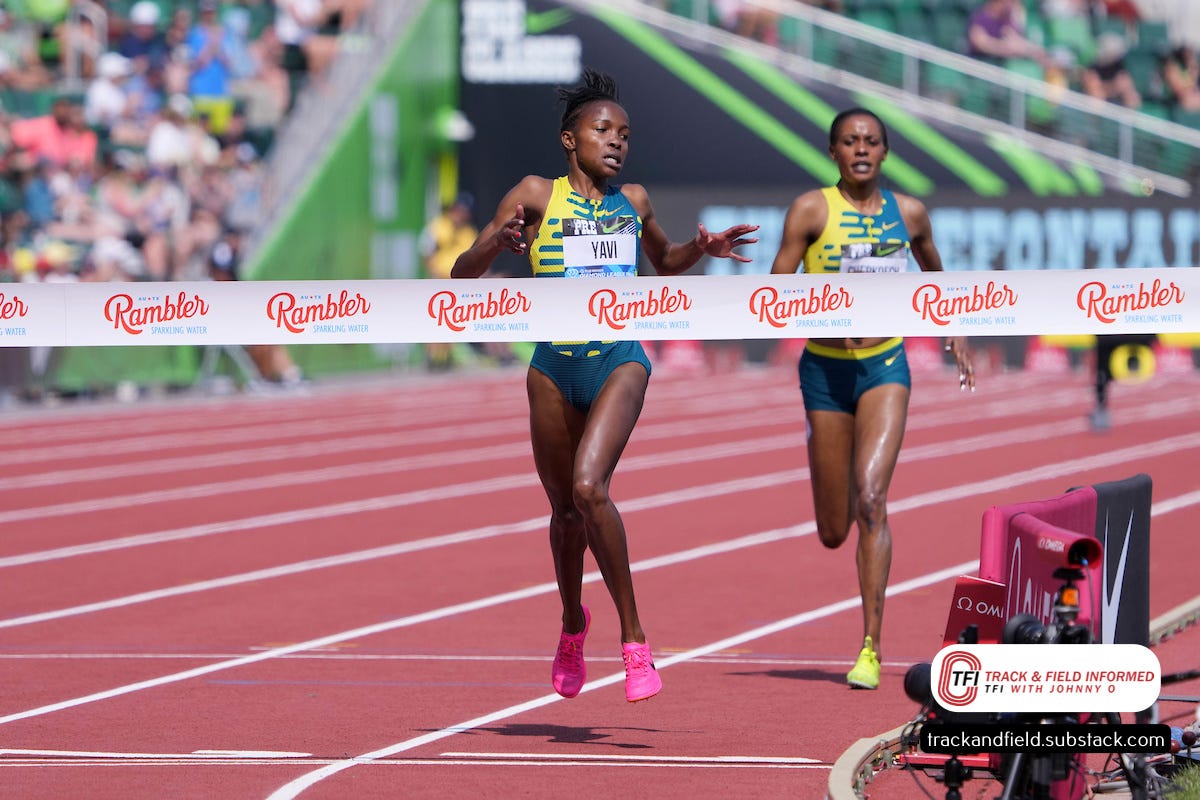
Ingebrigtsen took over the lead at that point, but he was never able to break away from the relaxed-running Nuguse, who was about a stride back of him when he came through 1,200 meters in 2:47.73.
Ingebrigtsen, who lowered the world record to 4:43.13 in the 2,000 meters in the Memorial van Damme meet eight days earlier, extended his small lead over Nuguse by a little bit coming around the final curve, but the 24-year-old American moved into the second lane as he entered the final home straightaway.
Ingebrigtsen appeared to pick up the pace at that point, but he was unable to expand his advantage over Nuguse, who finished fifth in the 1,500 in last month’s World Athletics Championships in Budapest, Hungary in a race in which the favored Ingebrigtsen was upset by Josh Kerr of Great Britain.
Saturday’s race was the fifth U.S. record of the year for Nuguse, who is in his first full season as a professional after graduating from the University of Notre Dame last year.
“I just had a season that I’m really proud of and I really wanted to end it on a really strong note,” he said when Lewis Johnson of NBC Sports asked him how he was able to stay so close to Ingebrigtsen. “And then I just came in, I was like, I know I’m as good as him. I know I can do it. I just have to stick with it. And so, stick through, push through. Didn’t quite get him there, but still it was an amazing race.”
Nuguse said in quotes on the meet website that it was the perfect race for him because he “just felt very unbothered the entire time, so it was all just really gritting it out and seeing who could run faster.”
The men’s mile was one of four races held on Saturday that were won with performances that ranked fifth or better on the all-time performance lists.
The others were the women’s 3,000-meter steeplechase, the men’s 400 intermediate hurdles, and the women’s 1,500.
The women’s steeplechase included 10 of the 15 finalists from the World Championships, and just as in Budapest, Winfred Mutile Yavi of Bahrain emerged victorious over Kenyans Beatrice Chepkoech and Faith Cherotich.
Pacesetter Peruth Chemutai of Uganda clocked 2:55.0 and 5:53.0 at the 1,000- and 2,000-meter marks before it turned into a two-woman duel between world-record-holder Chepkoech and Yavi.
The 23-year-old Yavi, who had sped away from the 32-year-old Chepkoech on the final lap of the World Championships, moved into the lead heading down the backstretch on the second-to-last lap. But she could not shake her older rival and Chepkoech briefly took a half-step lead over Yavi coming out of the final water jump.
However, Yavi was able to re-take the lead entering the home straightaway and she increased her advantage after clearing the final barrier of the race.
Her winning time of 8:50.66 bettered her previous national record of 8:54.29 that she had set in Budapest and it has only been bettered by the 8:44.32 world record that Chepkoech set in 2018.
Chepkoech finished second in 8:51.67, the third-fastest time in history, and the 19-year-old Cherotich finished third in 8:59.65 to move to 11th on the all-time performer list.
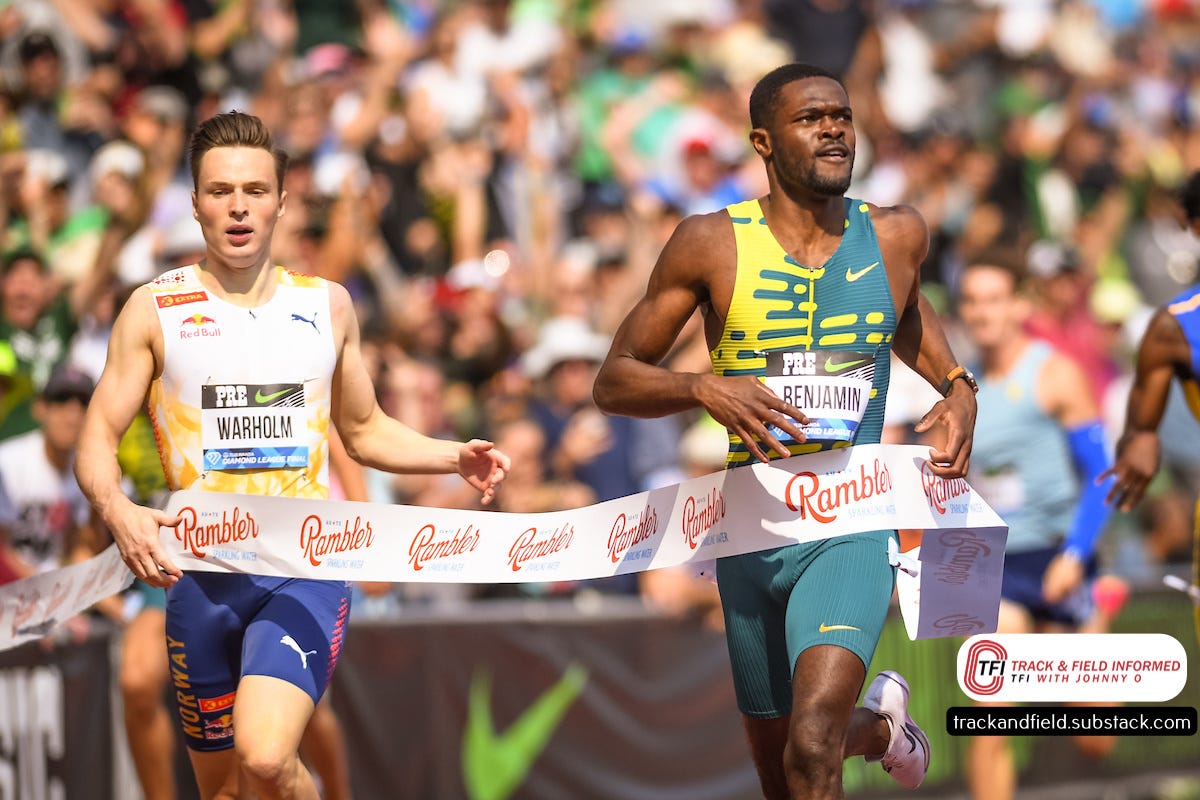
“Today I didn’t expect [to run] the second fastest time,” Yavi said in quotes on the meet website. “I’m so happy, I’m excited at the same time. I think this year has been precious, it has been so… good to me.”
Benjamin, the second-fastest man in history in the intermediate hurdles, had finished a disappointing third in the World Championships. But he powered down the final straightaway on Saturday to overtake world-record holder and three-time World champion Karsten Warholm of Norway for a 46.39 to 46.53 victory.
Benjamin’s time was fastest in the world this year and the fourth fastest in history while Warholm’s clocking was the seventh fastest ever tun.
Warholm, who set the world record of 45.94 while defeating Benjamin (46.17) for the Olympic title in 2021, trailed first-place Kyron McMaster of the British Virgin Islands for the three flights of hurdles. But he had drawn even with McMaster after the fifth flight of hurdles and he took the lead after that.
The 26-year-old Benjamin was in no better than third place coming out of the second turn, but he began to make up ground on Warholm as they approached the ninth set of hurdles. He was still a half stride behind him coming up to the 10th — and final — flight of barriers, but he outran Warholm decisively after that.
McMaster finished third in 47.31, followed by 2022 World champion Alison dos Santos of Brazil in 47.44.
“This was the race I was supposed to run a couple of weeks ago,” he said to Johnson of NBC Sports in reference to the World Championships. “But this is track and field. Things happen. Sometimes it’s your time and then other times it’s just not.”
When Johnson asked him about the significance of the victory, Benjamin said it was just a Diamond League Final.
“At the end of the day, I need to perform when it matters. And I know that, and… this is a stepping stone for me. So I’m just going to take it, drop it in the bucket, keep it moving, and then focus on next year.”
Faith Kipyegon of Kenya was an overwhelming favorite entering the women’s 1,500 and she showed why as she won the race by more than three seconds with a time of 3:50.72 that was the fifth fastest in history and the third best of her career.
The 29-year-old Kipyegon, who has set world records of 3:49.11 in the 1,500, 4:07.64 in the mile, and 14:05.20 in the 5,000 this season, had become the first woman in history to win both the 1,500 and 5,000 in the World Championships last month. But she looked remarkably fresh on Saturday.
After pacesetter Laurie Barton of the U.S. came through the first 400 meters in 62.64, Kipyegon and Barton came through 800 virtually together in 2:05.25 before Barton dropped out.
Kipyegon had a lead of about 10 meters over second-place Birke Haylom of Ethiopia at that point in the race and her advantage had more than tripled when she passed 1,200 meters in 3:06.07.
She then ran the final 300 in 44.65 seconds to finish well ahead of World Championship silver medalist Diribe Welteji of Ethiopia, whose 3:53.93 clocking in second place moved her to 10th on the all-time performer list and left her comfortably in front of third-place Laura Muir of Great Britain, who ran 3:55.16.
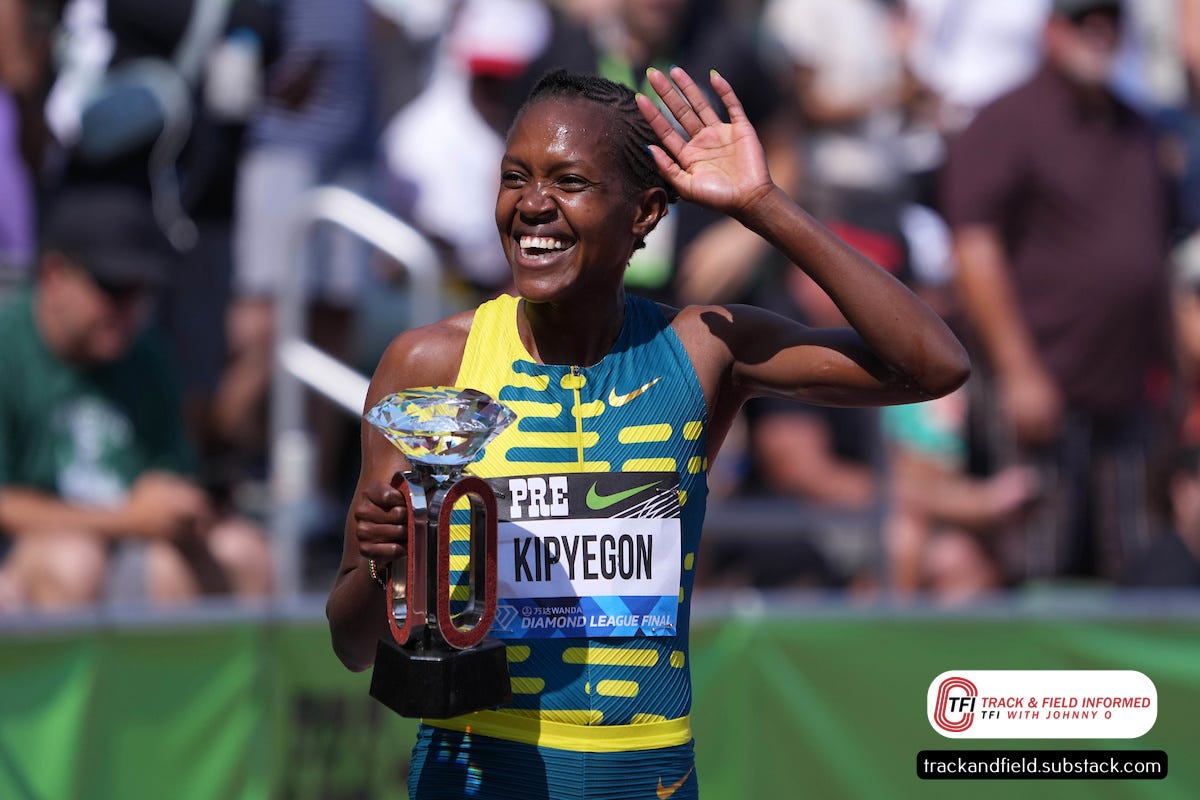
“I didn’t watch the clock,” Kipyegon said in quotes on the meet website. “I was just running my race and see what will happen at the finish line. So it was amazing, to run a meeting record, just fantastic. Starting with the world record and now winning the [Diamond League] trophy, it has been a fantastic year for me and I really thank God for that."
The four other highest-quality performances on Saturday were turned in by Yulimar Rojas of Venezuela in the women’s triple jump, Chase Ealey of the U.S. in the women’s shot put, Christian Coleman of the U.S. in the men’s 100 meters, and Shericka Jackson of Jamaica in the women’s 100.
Rojas, who had won an unprecedented fourth consecutive world title in Budapest when she went from eighth place to first on her final jump of the competition, did not have a consistent series on Saturday.
She fouled her first two attempts before bounding 14.53 meters (47 feet 8 inches) on her third. After another foul in the fourth round, she was in third place. But she put together a yearly world-leading effort of 15.35 (50-4½) on her fifth attempt before fouling on her sixth.
It was the record eighth outdoor meet of her career in which the 27-year-old Rojas has leaped 15.35 or better. Two other women — Inessa Kravets of Ukraine in 1995 and Francoise Mbango Etone of Cameroon 2008 — have combined to accomplish that feat twice.
Shanieka Ricketts of Jamaica was a notable second-place finisher behind Rojas as she bounded 15.03 (49-4¾) eight days after she had topped 15 meters (49-2½) for the first time in her career with a 15.01 (49-3) effort to win the Memorial van Damme meet.
Ealey capped her superb late-season surge in the women’s shot put by winning the event with an American record of 20.76 (68-1½).
The 29-year-old Ealey had bettered 20 meters (65-7½) in only one of her first 10 outdoor meets of the season prior to the World Championships. But she won her second consecutive title in Budapest with a best of 20.43 (67-0½) before winning the Memorial van Damme meet with a best of 20.05 (65-9½).
She took the lead with a 19.77 (64-10½) put in the first round on Saturday before hitting a personal best of 20.61 (67-7½) in the second round and improving that mark to 20.76 in the third to top the previous U.S. best of 20.63 (67-8¼) that Michelle Carter had set in winning the 2016 Olympic title in Rio de Janeiro on her final effort of the competition.
Ealey’s mark was the best in the world since 2015 and gave her a large margin of victory in a high-quality competition in which Sarah Mitton of Canada finished second at 19.94 (65-5), followed by Auriol Dongmo of Portugal at 19.92 (65-4¼), Jessica Schilder of the Netherlands at 19.88 (65-2¾), and Maggie Ewen of the U.S. at 19.82 (65-0½).
“That was something really important to me this season,” Ealey said about the national record in quotes on the meet website. “And to do it in the last meet - I held it off, didn’t I - but I’ve been wanting to do it all season, and I told my coach I was going to do it this meet. And so I felt really good about it. I was so excited.”
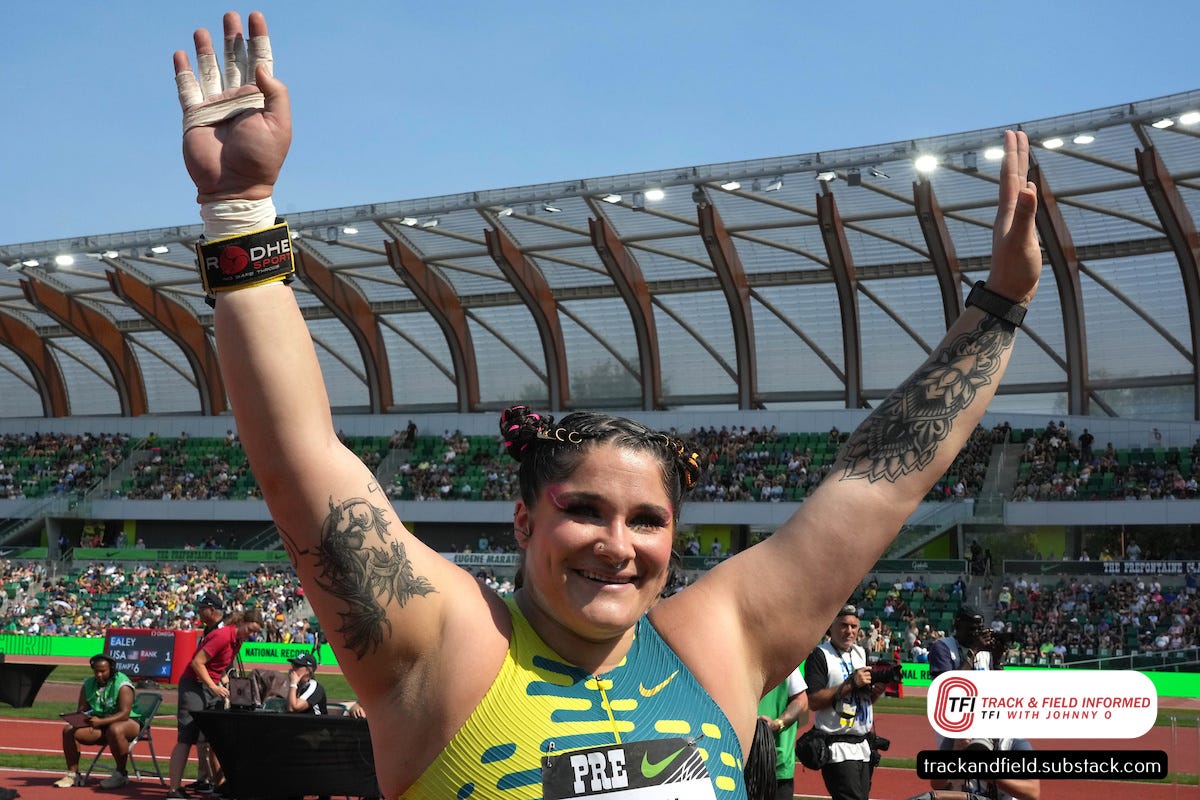
Coleman turned in his second consecutive 9.83-second clocking in winning the men’s 100 ahead of recently crowed World champion Noah Lyles of the U.S. (9.85), Ferdinand Omanyala of Kenya (9.85), and Kishane Thompson of Jamaica (9.87).
The 27-year-old Coleman had finished a disappointing fifth in 9.92 in the World Championships — in a race won by Lyles in 9.83 — after he was run down in the final third of the race. But there was no repeat of that Saturday.
He led the field out of the blocks as expected, before doing a better job of maintaining his speed over the second half of the race. Thompson had a slight lead over Omanyala in a battle for second place at the midway point, but he began to lose ground to the Kenyan after that.
Lyles, who had also won gold medals in the 200 and 400 relay in Budapest, got off to a mediocre start. And though he made up a lot of ground on Omanyala and Thompson in the last 30 meters of the race, Coleman had a big enough lead that he was able to raise his arms in victory as he crossed the finish line.
Coleman’s time was tied for the fifth fastest of his career, equaled the yearly world best shared by him, Lyles, and Zharnel Hughes of Great Britain, and came two weeks after he had run 9.83 in a Diamond League meet in Xiamen, China.
“I felt like I was ready to run [under 9.80],” Coleman told Johnson after the race. “I feel like I rushed it a little bit. But everything I’ve been telling myself in my mind, like to stay patient in my drive phase… I was able to relax and come out with the win.”
The 29-year-old Jackson ran the second-fastest time of her career — and of her season — in winning the winning women’s 100 in 10.70.
The runner-up in the World Championships, Jackson trailed Marie-Josee Ta Lou of Ivory Coast for the first 30-40 meters of the race, but she had drawn even with her by the midway point before she began to pull away.
Ta Lou finished a clear second in 10.75, followed by a resurgent Elaine Thompson-Herah of Jamaica in 10.79 and World champion Sha’Carri Richardson of the U.S. in 10.80.
Richardson had run a personal best of 10.65 in defeating Jackson (10.72) for the World title, but she had a poor start on Saturday and was never in the hunt for a top-two finish.
In other events held during the first day of the two-day meet, Katie Moon of the U.S. won the women’s pole vault at 4.86 (15-11¼) — after clearing that height in a jump-off with Tina Sutej of Slovenia — and Haruka Kitaguchi of Japan took the women’s javelin with a best of 63.78 (209-3).
On the men’s side of the meet, Kirani James of Grenada took the 400 in 44.30 and Simon Kiprop Koech of Kenya placed first in the steeplechase in 8:06.26 after Olympic and two-time World champion Soufiane El Bakkali of Morocco and world-record-holder Lamecha Girma of Ethiopia were late withdrawals from the race.
In men’s field events, Sanghyeok Woo of South Korea won the high jump at 2.35 (7-8½), Andy Diaz Hernandez of Italy placed first in the triple jump at 17.43 (57-2¼), and Jakub Vadlejch of the Czech Republic took the javelin at 84.24 (276-4).



